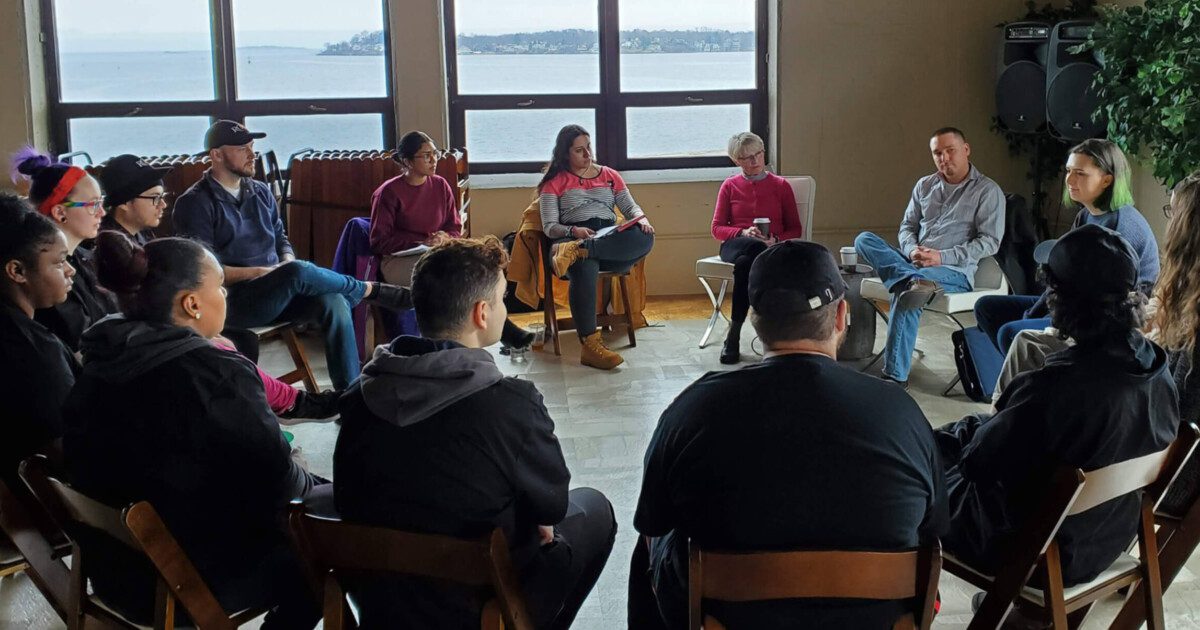
Almost without exception, they felt ready to leave college. Notwithstanding all the nerves and nostalgia, of which there were plenty, the recent graduates, now between six months and five years out, could recall at least some part of themselves that had been looking forward to the next phase.
Many had outgrown the behaviors that used to excite them, like drinking and going to parties. For others, the tipping point came as social tensions, having bubbled up during the last few semesters, finally boiled over. One was exhausted after spending four years as a first-generation student navigating higher ed without a blueprint. Another was just eager to jump into his career.
As ready as they imagined themselves for the next chapter, these young graduates would all come to miss certain comforts of the college experience before long. The real world, they found, also without exception, could be a rude awakening. And while “commencement” has always brought its share of anxiety, Gen Z grads have faced a confluence of challenging dynamics, including untested pandemic-related norms and the financial pressures of an inflated, uncertain economy. Where they fall on the graduation preparedness scale may determine their ability to make it beyond the “bubble” of higher education.

Harvard College graduate Wiley Schubert-Reed felt like adulthood claimed him overnight and without warning. “I felt pretty good about graduating, and I still feel pretty good about it,” he said, with an imminent “but” about to follow: He’s been finding himself weighed down by the transition from pursuing a physics degree to chasing solo musical aspirations in New York City, and yearning for the certainty and structure of Cambridge, Massachusetts’ hallowed halls.
A year since leaving college, Wiley continues to grapple with the liminal space he occupies between childhood and adulthood and wonders what makes it so confusing for him and many of his friends. Maybe the COVID-19 pandemic distorted his generation’s sense of time, or maybe it’s that he’s still living at home in the same city and house where he grew up. “I feel like the line of growing up is a little bit more obscure now than it was before,” he said. “I think my parents graduated from school and moved to the city and became adults. I don’t feel that way.”
However different the anxieties of college are compared to those of the “afterlife,” the question stands as to whether soon-to-be-grads tend to leave school with an adequate understanding of what awaits them on the other side.
Wiley’s experience mirrors that of many of his peers. The end of college brought the end of a slew of academic and social-related stressors he was keen to shed. It also created space for a whole new set of issues to crop up, and fester. “It definitely ebbed and flowed,” Wiley said of his mental health in college. “But it was far less existential than I think the things influencing my mental health are now.” The forces that controlled the Brooklynite’s mood as recently as a year ago, like homesickness or disgruntlement with his major, seem silly to him at this point. After all, college, and all the problems that came with it, had an endpoint, unlike in “real life.” “Now, it’s like this chapter is ending when I die,” he explained. “Now, it’s like everything is for life. Or it feels that way.”
However different the anxieties of college are compared to those of the “afterlife,” the question stands as to whether soon-to-be-grads tend to leave school with an adequate understanding of what awaits them on the other side—the freedoms and uncertainty, excitement and discomfort, self-discovery and, especially, loneliness. Education is often the most consistent form of structure in these students’ lives before they lose it. For all the energy and resources colleges dedicate to teaching students how to conquer academic life, they may be less apt to focus on preparing them to cope with its absence.
While some institutions may dismiss the concept of emotional preparation as “not their job,” taking a hands-off approach could be risky in 2023. In a recent survey on the mental health of recent graduates by the Mary Christie Institute, more than half (51%) of respondents reported needing help for emotional or mental health problems in the past year. More than half (53%) reported feeling burnout at least once per week (where burnout is “a state of prolonged physical and psychological exhaustion, which is perceived as related to the person’s work”). More than one third (39%) said their college did not help them develop skills to prepare them for the emotional or behavioral impact of the transition to the workplace.
Finding Community
“I don’t think it was the worst job in the world, but it certainly was a challenging office,” 27-year-old Ada (whose name has been changed) said of her first job post-college. After graduating from one of her state’s public universities she accepted a position working in a District Attorney’s office. The adjustment proved difficult as she struggled to fit in with her coworkers and find support among them. Actually, she admitted, it was miserable. “Three months, four months, five months after I graduated, I pretty much couldn’t get out of bed. So I had no choice but to seek help if I didn’t want the rest of my life to basically fall apart.”
For Ada, the toxic office environment was a product of some of the people as much as the work itself. By nature, the DA’s office can end up exposing its employees to “horrendous things,” Ada said, probably alluding to violent or disturbing criminal cases. But her stint there also coincided with a height of the Black Lives Matter movement, she said, opening up a dialogue among certain colleagues about police brutality and anti-Black racism. Their commentary didn’t strike Ada, who immigrated with her family from East Africa almost 20 years ago, as work-appropriate. “Being Black with all of these political conversations that are happening in office…” she drifted off. “I think sometimes it’s unfortunate how little people can actually articulate what their state of discomfort with you is.”
While Ada attributed the decline in her mental health after college only in part to her initial job, she experienced a drastic improvement once she’d left. “Surprisingly,” she added with dry amusement. After the DA’s office, she spent two years with a disability advocacy nonprofit, before becoming a program manager of the intercultural education office at a small liberal arts college. If the community at her old job drove her away, the one at her current office is why she sticks around. “I love my work. I love my students. The ones that I get to work with, they make the hard days easy.”
Now that she works in higher education, Ada’s understanding of the support, or lack thereof, for soon-to-be grads stems from her recent experiences as both student and staffer. “We ask students more about what they’re going to do and what their career goals are than if they have built any infrastructure to support themselves mentally when they leave college,” she said. “Because they’re not going to have quick access to their friends. They’re not going to have quick access to a meal, whereas college really does create a bubble and create this life that is really not in the real world.”

For young people at this vulnerable stage, hungry for the kind of social network they built in college, the community they find at work can make or break the larger job experience, especially for those from marginalized backgrounds. In 2022, 25-year-old Emma Womack graduated from Amarillo College, a community college in Amarillo, Texas, with two degrees in welding and machining and wary of being a woman in a male-dominated field. The Texan, hailing from Bushland, had been the only woman in her welding program and one of two in the machining program. When she started job searching, she remembered an unfortunate interview at what she called a “really cool” fabrication company in Austin. “They asked me questions like, ‘Are you aware that you’re going to sweat? Are you aware you’re going to be working outside?’ And then they didn’t even let me take a weld test, whereas if I were a male, they wouldn’t have asked those kinds of questions,” she said. She didn’t accept the job.
As for the position Emma did end up taking, a machinist apprenticeship at Los Alamos National Laboratory in New Mexico, positive social interactions have set it apart. “I have only male bosses, which was a little unnerving. But they’ve all been fantastic. I couldn’t have asked for better bosses honestly,” she said. She credits the ladies’ lunches organized by the company with nurturing a community of women even amid the male environment. There’s also a wellness center and a range of employee resource groups, including for LGBTQ+ people and those affected by addiction. “They have a lot of support here, which is super awesome, because I know a lot of places don’t have that.”
Wiley Schubert-Reed, the Harvard grad, has felt the absence of similar support as he pursues a career as an independent musician. Given the only structure in his life is what he constructs, he often questions whether he’s on the right path, wishing he could tap into the minds of those who charted the waters before him. “Harvard preaches to have this huge, wonderful network of people everywhere,” he said, “but unless it’s the finance world, they’re kind of impossible to get in touch with.” He’s reached out to alumni but rarely hears back, and laments that his alma mater doesn’t play a more formal role in facilitating mentorship opportunities for everyone. “Just to feel like you have some sort of authority figure offering you guidance, like when you have an academic advisor or mentor in school, that could be helpful. And I think that would be helpful for non-artistic people, too.”
Mentors have long been regarded as important influencers for students, particularly in readying them for career. According to Gallup, college graduates are almost two times more likely to be engaged at work if they had a mentor in college who encouraged them to pursue their goals and dreams. Alumni mentorships could be one way to soften the landing for young graduates by providing them the unique perspective of someone recently in their shoes. Given the paucity of formal mentor programs within higher education, the wide proliferation of this “add-on” remains a challenge. Additional research from Gallup shows that less than half of graduates (43%) said they had an undergraduate mentor who encouraged them to pursue their goals. The mentorship gap is even greater for minority graduates, who were 25 percentage points less likely to say they had a faculty mentor than their White peers.
“Oh my God,” he remembered thinking about his first job. “This just sucks. I don’t want to be here, but I have to be here. There’s nothing I can do about it.’”
The need for connection, whether with mentors or peers, became particularly, sometimes painfully apparent to those who started their first jobs during the COVID-19 pandemic. When 26-year-old Sophie (whose name has been changed) graduated from Texas A&M University, she kicked off her new job at an audit advisory firm online, living and working from her childhood home west of Houston. Her employer, whom she connected with through a career fair during her senior year, won her over thanks to an on-site visit. “The office visit was so cool, and all the people were so fun and nice,” she said. “Funny enough, I never got to go to the office until way later.” There were days in the first months of her job during which she never spoke to another employee.

Coming from college, which Sophie remembered as a hub of constant interaction, the self-proclaimed extrovert had expected to be more social when her job started. “It definitely affected me personally because I wanted more out of work than just sitting behind a computer creating massive Excel models.” Once she started working in-person, building relationships in the office became easier, not to mention valuable in the face of long hours, competitive coworkers, and high-pressure evaluations. Still, after three years, she said she’s considering a career shift, having grown tired of crunching numbers to make clients happy, rather than investing in a mission she truly believes in. “The only thing that really keeps you there is the connections you make at the company,” she explained.
What’s the Purpose?
The compounded effect of not being particularly interested in his line of work and not having a community to compensate was enough to send 25-year-old Michael running from his job in tech sales. “In my first job, there was a point where I dreaded waking up and logging on my computer just because I hated it so much. I hated everything about it,” he said. As a senior, Michael recalled being so focused on finding a job—intent on earning a salary, moving into his own apartment, and diving into the next chapter—that he didn’t think long or hard about what kind of job would suit him. He now encourages seniors to carefully consider who they are and what they’re passionate about before selecting a job for the sake of it or because their friends are pursuing something similar.
“Oh my God,” he remembered thinking about his first job. “This just sucks. I don’t want to be here, but I have to be here. There’s nothing I can do about it.’”
Even having moved on to a second job he enjoys more, Michael said he’s still coming to terms with the less-than-fuzzy reality of the corporate world. “I figured it was just going to be similar to college, but in a different, more mature way. That was not the case. It was very different. You’re just kind of a number.” He often only sees colleagues through his computer screen and imagines they only care about him insofar as he makes money for the company. Although his exhaustion has changed since the pandemic, when managing to get out of bed was a feat, he continues to worry about the sustainability of his career. “I wouldn’t say it’s burnout where I feel like, ‘ I can’t go on with this.’ I think it’s more of an existential, ‘What am I doing? How long am I gonna be doing this? At what point does this change?’”
Michael may have benefitted from more structured encouragement to contemplate what career would best suit him. Some colleges have begun providing these forums for students to figure out how to ‘align who they are with what they do.’ At Bates College, for example, the Center for Purposeful Work has pioneered helping students mull over their “purpose” and identify work that brings them meaning through curricular infusion models, practitioner-taught courses, internships, and job shadowing. Even if these experiences do not expose the students to promising fields of interest, they learn to pivot to new opportunities.
“Aligning your work with your interests, strengths, and values gives you the agency you need to make the right career decisions, those that will bring you meaning and purpose in your life, which we know is a significant driver of wellbeing,” Clayton Spencer, who recently stepped down as president of Bates, said.
In 2018, Bates partnered with Gallup on a survey in which 80% of college graduates said deriving a sense of purpose from their work was extremely important (43%) or very important (37%). Yet less than half of these graduates had succeeded in finding it. Likewise, the study showed that graduates with high purpose in work are almost ten times more likely to have high overall well-being.
“I think especially with a good college degree, it’s pretty easy to find ways to make money,” Wiley continued. “The question is more, can you find ways to make money via what you feel passionate about as well?”
The decision to abandon a promising career that becomes mentally or emotionally damaging isn’t always straightforward. The comparative culture and social pressures to make money often intensify outside of college, where many students had access to the same classes, dorms, and dining halls. Off campus, what gym friends belong to or even how much they spend on salads for lunch begins to reflect the kind of job they have and how well they do it, Michael said. “I would say, certainly after the first year and into the second and third, a big part of social connotations is frankly, and this is terrible, but how much money do you make?”
Spencer is quick to emphasize the practical dimensions of Purposeful Work, including financial considerations. “The reflection that lies at the heart of Purposeful Work helps students figure out what they are or are not interested in, what they are or are not good at, and what kinds of work experiences activate their strengths in ways that build excitement and a sense of momentum. Students also see adults in the workplace whose choices reflect a series of value-based judgments about how important financial concerns are to the kind of life they wish to live.”
Ada, who comes from a low-income background, said the promise of a higher salary swayed her decision to leave a job she loved. Learning to manage money continues to be an uphill climb for her. “I think coming from low income means you know how to stretch $20 into $200. So there’s that, but that’s not really money management, that’s just making do with what you’ve got,” she said. “To be honest, even at 27, I’m still learning about money. I don’t really know money.” Her basic approach involves ensuring all the necessities get paid for on time and “then dealing with the rest.”
“What people don’t really understand with first-gen is there isn’t anyone to turn to and be like, ‘Hey, how do I budget this?’ How do I create a spreadsheet?’ There isn’t anyone,” Ada continued. Whether from a first-generation background like Ada or supported by a mom who works for a tax filing company like Sophie, the path to financial literacy for young professionals can seem never-ending and discouraging. When the Mary Christie Institute polled young professionals about their mental health last year, nearly half (46%) reported their financial situation was always or often stressful. Financial stress also correlated with overall mental health, as nearly two-thirds (61%) of respondents with more financial stress said their mental health was fair or poor, compared to under one-third (31%) of those with less financial stress.
Many colleges offer financial literacy programs. Whether students have the foresight to seek them out before graduation or know they exist is an issue. At Stanford University, the Mind Over Money financial wellness program offers free financial coaching and online learning modules. At Texas Tech University, students pursuing personal financial planning degrees offer guidance to their peers through the Red to Black financial coaching program. Yet, Inside Higher Ed’s Student Voice survey last year indicates more than two-thirds (67%) of student respondents were “not sure what is offered” in the way of personal finance education at their institution.
Accepting a tighter budget is a compromise many who lead with their passion may be forced to make. Wiley has confronted this reality as he pursues a less secure line of work in the arts. Saving on rent by living with his parents and earning a salary from his second job keep him feeling like money-related concerns hold him back from socializing. Long-term uncertainty plagues him. “I’m happy to spend two or three years struggling and figuring stuff out, but what if in five years, my friends stay at their corporate companies and are making millions of dollars a year and my art doesn’t go anywhere and now I literally have zero income or prospects?” he asked aloud.
“I think especially with a good college degree, it’s pretty easy to find ways to make money,” Wiley continued. “The question is more, can you find ways to make money via what you feel passionate about as well?”
Working through questions with such life-altering consequences is ultimately up to the individual, as these young people have all acknowledged. The take-away for higher education may simply be providing the opportunities, the support, and the experiences to do so.
The post Anxious to Launch appeared first on LearningWell Magazine.




